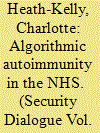|
|
|
Sort Order |
|
|
|
Items / Page
|
|
|
|
|
|
|
| Srl | Item |
| 1 |
ID:
151190


|
|
|
|
|
| Summary/Abstract |
This article explores the extension of counter-radicalisation practice into the National Health Service (NHS). In the 2011 reformulation of the UK Prevent strategy, the NHS became a key sector for the identification and suppression of ‘radicalisation’. Optometrists, dentists, doctors and nurses have been incorporated into counter-terrorism and trained to report signs of radicalisation in patients and staff. This article explores how calculative modalities associated with big data and digital analytics have been translated into the non-digital realm. The surveillance of the whole of the population through the NHS indicates a dramatic policy shift away from linear profiling of those ‘suspect communities’ previously considered vulnerable to radicalisation. Fixed indicators of radicalisation and risk profiles no longer reduce the sample size for surveillance by distinguishing between risky and non-risky bodies. Instead, the UK government chose the NHS as a pre-eminent site for counter-terrorism because of the large amount of contact it has with the public. The UK government is developing a novel counter-terrorism policy in the NHS around large-N surveillance and inductive calculation, which demonstrates a translation of algorithmic modalities and calculative regimes. This article argues that this translation produces an autoimmune moment in British security discourse whereby the distinction between suspicious and non-suspicious bodies has collapsed. It explores the training provided to NHS staff, arguing that fixed profiles no longer guide surveillance: rather, surveillance inductively produces the terrorist profile.
|
|
|
|
|
|
|
|
|
|
|
|
|
|
|
|
| 2 |
ID:
169926


|
|
|
|
|
| Summary/Abstract |
Scientific knowledge on what works in countering violent extremism remains limited. This article argues that we should move away from the “what works?” question and towards: “what works, for whom, in what circumstances, and how?” This method is also known as realist evaluation. This article applies the realist review method to CVE studies, which synthesizes the existing CVE literature and helps us gain insight into relevant contexts, mechanisms, and outcomes for CVE. Realist reviews help to develop and shape more effective policy and contribute to further CVE theory development.
|
|
|
|
|
|
|
|
|
|
|
|
|
|
|
|
| 3 |
ID:
184116


|
|
|
|
|
| Summary/Abstract |
In this article, we investigate how the EU mobilises a spatio-temporal imaginary of the “local” in its counter-radicalisation activities as a means of navigating subsidiarity principles and expanding its remit as a “holistic security actor” (cf. Baker-Beall [2016]. The European Union’s fight against terrorism: discourse, policies, identity. Manchester: Manchester University Press). Extant work on the EU’s terrorism prevention efforts has focused on how the organisation constructs transnational terror threats that require supranational, EU-level responses. Our research makes an original contribution to these literatures by demonstrating how the EU also seeks to intervene “below” the level of the nation state. EU counter-radicalisation works directly with subnational actors in municipalities, cities, and frontline public services across Member States. Employing the first systematic analysis of the EU’s Radicalisation Awareness Network (RAN) outputs, we demonstrate how “the local” frames pre-emptive counter-terrorism interventions as “upstream”. “Closer”, or “localised”, reads as “earlier” in this discourse. We also unpack how EU institutions and Member States have voiced concerns about the circumvention of subsidiarity (through engagement with local actors across the Union), by criticising the “effectiveness” of RAN. While the European Commission has taken steps towards addressing these grievances, its proposals reflect a further renegotiation and repositioning of the EU as a security “facilitator” across spaces deemed simultaneously local and transnational.
|
|
|
|
|
|
|
|
|
|
|
|
|
|
|
|
|
|
|
|
|